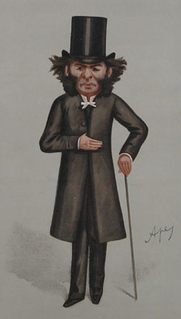A Quote by Hugh Reginald Haweis
Personality is that which is most intimate to me—that by which I must act out my life. It is that by which I belong to man, that by which I amable to reach after God; and He has given to me this pearl of great price. It is an immortal treasure; it is mine, it is His, and no man shall pluck it out of His hand.
Related Quotes
To be successful, a man must exert an effective influence upon his brothers and upon his associates, and the degree in which he accomplishes this depends on the personality of the man. The incandescence of which he is capable. The flame of fire that burns inside of him. The magnetism which draws the heart of other men to him.
Man with all his noble qualities, with sympathy which feels for the most debased, with benevolence which extends not only to other men but to the humblest living creature, with his god-like intellect which has penetrated into the movements and constitution of the solar system- with all these exalted powers- Man still bears in his bodily frame the indelible stamp of his lowly origin.
Man is more than his environment. It is from the innate quality of the Spirit in him, his inner storehouse, that he draws those ideas, his intuitions, which unify his perceptions of the external world instantaneously with a value which is qualitative and not quantitative, and which he embodies in the works of his culture - those achievements which belong not only to one particular time but to all times, and mark the path of his upward progress.
Criticism has plucked the imaginary flowers on the chain not in order that man shall continue to bear that chain without fantasy or consolation, but so that he shall throw off the chain and pluck the living flower. The criticism of religion disillusions man, so that he will think, act, and fashion his reality like a man who has discarded his illusions and regained his senses, so that he will move around himself as his own true Sun. Religion is only the illusory Sun which revolves around man as long as he does not revolve around himself.
Philosophers have long conceded, however, that every man has two educators: 'that which is given to him, and the other that which he gives himself. Of the two kinds the latter is by far the more desirable. Indeed all that is most worthy in man he must work out and conquer for himself. It is that which constitutes our real and best nourishment. What we are merely taught seldom nourishes the mind like that which we teach ourselves.
The universe shows us the life of God, or rather it is in itself the life of God. We behold in it his permanent action, the scene upon which his power is exercised, and in which all his attributes are reflected. God is not out of the universe any more than the universe is out of God. God is the principle, the universe is the consequence, but a necessary consequence, without which the principle would be inert, unfruitful, impossible to conceive.
As long as a man is persuaded that he can make even the smallest contribution to his salvation, he remains self-confident and does not utterly despair of himself, and so is not humbled before God. Such a man plans out for himself a position, an occasion, a work, which shall bring him final salvation, but which will not.
Reason cannot desire for man any condition other than that in which not only every individual enjoys the most absolute, unbounded freedom to develop himself out of himself, in true individuality, but in which physical nature, as well, need receive no other shaping by human hands than that which is given to her voluntarily by each individual, according to the measure of his wants and his inclinations, restricted only by the limits of his energy and his rights.
Caution has its place, no doubt, but we cannot refuse our support to a serious venture which challenges the whole of the personality. If we oppose it, we are trying to suppress what is best in man - his daring and his aspirations. And should we succeed, we should only have stood in the way of that invaluable experience which might have given a meaning to life.
All doctrines relating to the creation of the world, the government of man by superior beings, and his destiny after death, are conjectures which have been given out as facts, handed down with many adornments by tradition, and accepted by posterity as "revealed religion". They are theories more or less rational which uncivilised men have devised in order to explain the facts of life, and which civilised men believe that they believe.






































